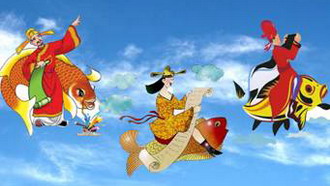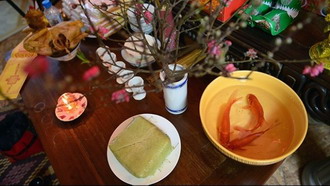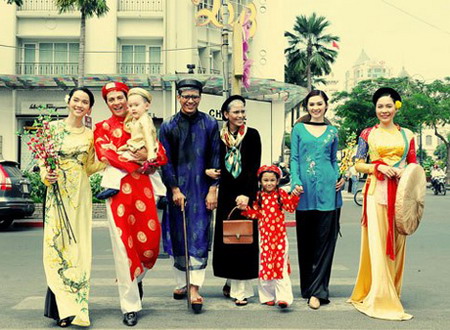-
 .
. -
 TIGER TOURS
TIGER TOURS
Tet holiday plays a very important role in the Vietnamese’s life for not only being the biggest occasion of family reunion, but also for marking the beginning of a new year on lunar calendar. In hopes for getting a new year full of luck and prosperity, Vietnamese people have so many customs that are requested to and not to be done by all families. In this article we will introduce to you some good-to-know customs when Tet comes, and hope that you can have a better insight of the Vietnamese when traveling here.
1. Cung Ong Tao:

Ong Tao (Kitchen God) relates to an old story about two mans and one woman who lived very gratefully and therefore made Ngoc Hoang (King of Heaven) feel pathetic. He then decided to let the three of them become Gods of Kitchen and have the responsibility to watch over all families on Earth.
Literally means “give offerings to the Kitchen God”, Cung Ong Tao is a special custom that happens on the 23rd of December of lunar calendar. On this day each family will set up an altar in an open-air area to worship “Ong Tao”. The altar will be displayed with many kinds of savory food, fruits and sweets. Moreover, there are false clothes, shoes and carp made from colorful paper. It is believed that the Kitchen God will ride a carp to heaven, making an annual report about household’s activities in the year.

In present day, the Vietnamese also offers “Ong Tao” false motorbike, car or even airplane instead of false carp. Why? Because they believe it will help him move faster on the way going to heaven.
2. Tao mo (cleaning ancestors’ graves):
This custom has the purpose of showing respect and gratitude towards ancestors. In Vietnamese culture, death is not the end; instead the soul will still remain and wait to be reborn in an afterlife. Hence, the dead’s family has to take care of his grave carefully as it’s also his home. In preparation for Tet, usually from December 20th to 25th of lunar calendar, the family will choose one day and go “Tao mo” together. They will come to the graveyard, mow the grass, repair and clean the graves. Afterward, family members will burn incense and also offer some kinds of food for the deceased in the meaning of welcoming them back to celebrate New Year with their descendants.
3. Xong dat (carefully choosing the first visitor):
Also known as “Dap dat” in the Central, this is a common belief among the Vietnamese that the first person who enters the house in the New Year could bring luck or bad luck to the family for the rest of the year. Therefore, it’s very important to have an appropriate person to “Xong dat”; to put the first step on a house’s door.
According to Eastern Zodiac, there are 12 animals from the Zodiac taking turns to monitor and control the earth for a year. The Vietnamese believes that the chief animal of the year when the visitor was born should be in harmony with the house owner’s chief animal and the animal of the upcoming year.

For example, 2017 is believed to be the year of the Chicken. If the house’s owner was born on the year of the Mouse, the most suitable visitor that brings great fortune is somebody who was born in the year of the Dragon, the Monkey or the Buffalo. In case the owner can’t find anyone suitable, then he will choose among his relatives or friends someone who has a good personality (gentle, generous, honest, etc.) to do that mission. Sometimes a house’s owner “Xong dat” himself by going out before midnight and comes back after the clock strikes 12am.
4. Chuc tet va Mung tuoi (giving wishes and lucky money):
When Tet comes, the Vietnamese not only wants to get luck and fortune for themselves, they also want to give them to the others. In the first morning of the year, people dress in their most beautiful clothes visiting their families and giving wishes to each other. If not living in the same house, the whole family usually meets at the eldest’s or the house that has main ancestor’s altar. After talking for awhile, people start to “Chuc tet” or “Giving whishes”. The common wishes are “Suc khoe doi dao – May you have a good health”, “Van su nhu y – May everything you wish come true” or “An khang thinh vuong – May you have a lot of fortune”, etc.
.jpg)
Then comes the custom of “Mung tuoi” or “Giving lucky money”, it’s normally between adults and children. The other name of it is “Li xi”. The money (according to your willingness) will be put inside red envelops and given to kids as a wish for a year full of wealth and luck. They must show their respects and give best wishes before receiving the treats. However, this custom may cause a small headache if you have many nephews and nieces, because “Li xi” is the most anticipated part with them on the first day of Tet.
5. Xuat hanh (choosing the right time and right direction to leave the house):
The Vietnamese believes it’s very important to carefully choose the appropriate time and direction to leave the house in the first morning of the year. Especially, the house’s owner has to beware of this matter because it will affect his career and family for the whole year. According to Feng Shui, there are two main directions for a person to follow. One heads to the Fortune God and the other heads to the God of Happiness. Base on his wish, the house’s owner will choose for himself the suitable direction. Not as strictly as choosing the one above, there are a few options for the right time slot to “xuat hanh”. Each of them can be up to 2 hours and is only known by a very knowledgeable person in this field.

When “xuat hanh”, people firstly visit their family, then go to a pagoda or a temple to pray, make wishes for a good new year. At the pagodas or temples, they also ask for “Loc” and “Xam”, which are lucky gifts from the pagoda. Usually “Loc” is a branch off of one of pagoda’s tree, will be put on the family’s altar as a wish for “growing and developing” during the year. “Xam” is a piece of bamboo with calligraphy words on it, usually used for describing what you will face (either good or bad things) in the next year.
By Tiger Team